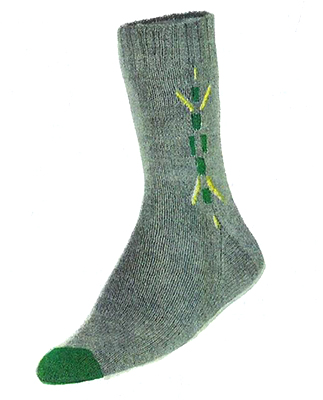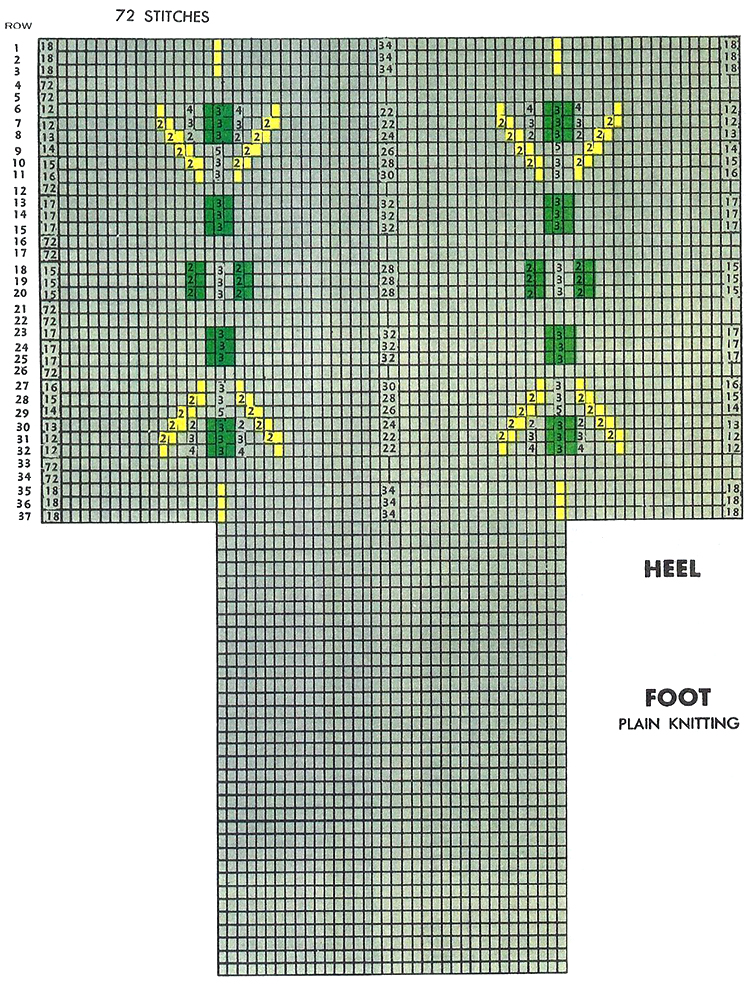Clock Socks Pattern #7218

Simplified multi-color knitting with color charts. Stitch sequences numbered. Each row knitted across and purled back in the same colors.
Knit right and left socks, if you wish. Sock sizes 10 to 13.
IMPORTANT
Knit across and purl back each row before starting next row. Use size NUMBER ONE needles. Knitting tension should be tight enough to produce about 10 stitches per inch. If you do not obtain this gauge-then change to larger or smaller needles as your particular knitting tension requires. The size needle does not matter as long as the stitch gauge attained is correct. Note: 10 stitches per inch means 'as knit', without allowance for blocking. Socks then block to about 9 stitches per inch on usual size dryers, and will cling snugly to the average size leg when worn. For a very small size leg (such as 7 inches around above ankle) you may wish to knit to a tighter tension gauge than mentioned above, using the smallest possible needles. Use your own choice of yarn colors.
DIRECTIONS
MATERIALS—(Note: Different brands of yarn vary in yardage. The following yarn quantities, per pair of socks, are approximate only.) 3 oz. basic color (grey), 5 yds. green, 5 yds. yellow. Socks illustrated are 7 inches long above top of heel, including 2 inches of ribbing. If longer socks are desired, add ribbing. Use size No. ONE sock needles, double pointed, and regular 3-ply sock yarn.
IMPORTANT—Use needles and yarn in these accurate sizes in order to achieve proper size sock per this pattern. Knitting tension should produce an average gauge of about 10 stitches per inch. Note: Use bobbins to carry your yarn in small quantities of each color. These will dangle conveniently clear of your work avoiding entanglement. However for the small color groups of this pattern, it is possible to dispense with bobbins and just work with a short strand of yarn dangling free at each color group. The basic color yarn (grey) can be carried across one or two interrupting stitches of other colors (on wrong side of work of course) in order to decrease number of bobbins of this color that are necessary. But do not try to carry across 3 or more stitches—the resulting loop is undesirable. You will therefore need 3 bobbins of grey to work the rows where the 3-stitch sequences of green interrupt the grey.
LEG PATTERN—This part of the sock is knitted in a flat piece, to be folded and sewed together up the back when completed. First cast on 72 stitches of the grey and knit 2, purl 2, for ribbing for 2 inches. Start pattern, each row of which consists of knitting across and purling back. Knit the first row as shown, that is 18 grey, 1 yellow, 34 grey, 1 yellow, 18 grey. These numbers are indicated on the graph to save counting squares. In changing colors always twist yarns around each other once to avoid leaving a hole. Now turn and purl back ON THIS SAME ROW using the same colors in the same places. Continue knitting the successive rows in this manner using the color sequences indicated on the graph. After row No. 37 the work separates to knit the heel. Divide the 72 stitches, taking 18 off each end and place on a separate needle for the heel. In so doing the leg of the sock is folded into position for sewing up the back later. Leave the 36 center stitches on one needle and discontinue work thereon while doing the heel.
HEEL (Reinforced type)—Using the 36 stitches on the heel needle, slip 1, knit 1, in sequence for the first row, then purl back. Continue thus in successive rows for 2 inches. On the last purl row, purl 20 stitches, then purl 2 together, purl 1 and turn work. Then:
Knit back 6, knit 2 together, knit 1, turn.
Purl back 7, purl 2 together, purl 1, turn.
Knit back 8, knit 2 together, knit 1, turn.
Purl back 9, … etc.
Knit back 10, … etc.
… etc.
Continue in this manner, advancing the number of stitches worked at each end in this order, and thus making rounded bottom of heel until all stitches are used, work then being all on one needle across bottom of heel. Now pick up stitches along the forward edges of the heel thus knitted, and add to the work in progress. About 21 or 22 stitches should be picked up on each side of the 2-inch long heel, and all of these heel stitches should be evenly divided on 2 needles.
INSTEP—At this point the entire sock is on three needles, consisting of the instep needle with the 36 center pattern stitches (which must be kept separate), and the two underfoot needles on which the stitches along the edge of the finished heel are evenly divided. Now use a 4th working needle and knit the plain-color foot round and round as with plain socks, and at the same time form the triangular gusset which widens the ankle, by decreasing 1 stitch at the forward point of each underfoot needle ON EVERY OTHER ROW until only 18 stitches remain on each underfoot needle. You will probably decrease 13 or 14 times depending on whether 21 or 22 stitches were picked up along the heel edge. Continue knitting the foot without further decreasing until 2½ inches from the desired length of the foot.
TOE—Now start decreasing to shape toe, as follows: Decrease 4 stitches on the next row, these being the end stitches on the instep needle, and the stitches next to these, one on each underfoot needle. Knit 4 rows plain then 1 row decreasing 4 stitches as before, 3 rows plain, 1 decreasing, 3 plain, 1 dec., 2 plain, 1 dec., 2 plain, 1 dec., 1 plain, 1 dec., then decrease every row until only 16 stitches remain (8 on instep needle and 4 on each underfoot needle.) Weave toe as follows: Place yarn in a tapestry needle and, with yarn coming from back of knitting needle, put it in first stitch of front (instep) needle as if to knit and slip it off. Then put it in the next stitch of front needle as if to purl and leave it on. Go to back (underfoot) needle and insert as if to purl and take it off, then to next stitch of back needle as if to knit and leave it on.
This designation may assist:
Front needle K—off, P—on
Back needle P—off, K—on
Repeat thus to the end of the 8 stitches on each needle.
FINISH—Sew sock up the back, using corresponding color of yarn and tapestry needle. Finish inside of sock by weaving any thread ends into nearby seams, trimming ends, etc. Block socks on dryers of proper size.
GENERAL DIRECTIONS
Each square equals one stitch, knitted and/or purled. Sequences of stitches in particular colors to form a pattern are shown in color and by numbers on the specific pattern graphs. This saves counting squares. The number of rows and number of stitches in each, depend on the symmetry of the pattern design, also on the approximate size of sock desired in order to fit the wearer's leg. Size and dimensions are indicated in each particular pattern.
Each row is normally knitted and purled back in the same colors. For certain patterns which are easily repeated, the knitter may, in purling back, go to the next row. In this case the indicated pattern will be reduced in size by one-half, and the entire pattern must then be repeated in order to achieve the length indicated.
Heel, bottom of foot, and toe are knitted in the manner of plain socks. In certain patterns where the instep is a plain color, and the same color as the foot, this part of the sock may be knitted round and round as in plain socks.

| Pattern Categories Browse the categories to help you find the patterns you're looking for. |
||
|
||










